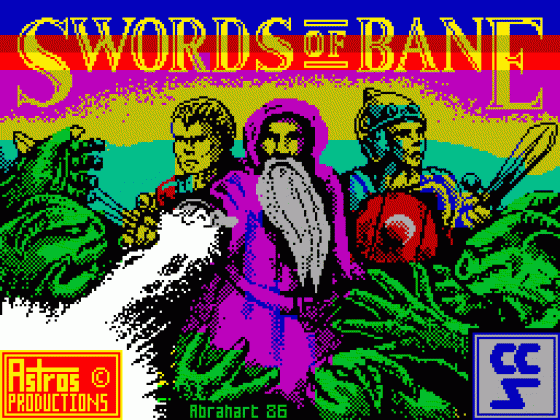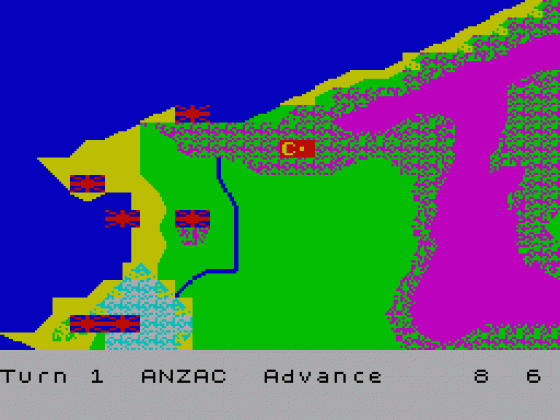
ZX Computing
 1st January 1987
1st January 1987
Publisher: Cases Computer Simulations
Machine: Spectrum 48K/128K
Published in ZX Computing #33
CCS has released three new challenges for Spectrum Generals. Tony Hetherington reports from the front
Wargames
CCS is rapidly achieving the reputation as being the wargamers. Three new games as different as the campaigns they simulate add to an impressive line up which already includes games such as Desert Rats and Arnhem.
In this latest batch of blood 'n guts for the thinking gamer, prospective Generals play Napoleon at the battle of Eylau, replay the disastrous WW1 Gallipoli campaign and tangle with monsters and wizards in Swords Of Bane.
Gallipoli
The Gallipoli campaign was typical of the disastrous WW1 conflicts in which both sides suffered terrible casualties largely due to idiotic Generals. Would it be different with you in charge?

Gallipoli can be played by one, two or three players each controlling the British, ANZAC (British, Australian and Gurkha forces) and Turkish armies with the computer ready to play the game if you haven't enough players.
The object of the game seems relatively simple in that the Allies with a total of 60,000 troops must advance to take the Turks' main ammunition dump before reinforcements arrive to support the 22,000 Turkish troops.
The gameplay follows accepted wargame standards with a cursor being moved around the forces issuing commands. It is the choice of orders that make this game unique.
As well as the usual move and fire orders, Gallipoli troops can dig trenches forming the almost impassable lines typical of WW1.
In the expanded 128K version (included as part of the game), players can dig tunnels between trenches and set bombs off under the enemy forces to try to break the deadlock.
The expanded version also extends the combat sequence from the standard comparison of opposing armies' strengths and terrain cover by the inclusion of a sub game.
You can play a single soldier looking out onto a battlefield that contains ten hidden enemy soldiers. These fire at you in turn, revealing their position giving you a few seconds to shoot at them. After twenty shots, the computer evaluates your performance which determines the result of all battles in that turn.
Unfortunately, this spoils the game, reducing a challenging simulation into a fairground shooting gallery. Luckily, it's only an option that can be ignored.
Scores
Overall 58%
Napoleon At War
The battle of Eylau was close run affair between Napoleon and the combined Russian and Prussian forces and therefore ideally suited to conversion into a wargame.
This simulation offers prospective Napoleons not only a computerised opponent but also digital commanders that will carry out your general orders as best as they can.
If they run out of ideas or feel their position is impossible, then they'll send you a message.
Alternatively, you can run the whole battle yourself as in a standard wargame but I preferred to use the Commanders which added a new dimension to a fascinating period of history.
The game itself is a tricky balancing act between holding onto the town of Eylau while striing at the advancing enemy. Sit back and wait for the attack too much and you'll be left with no defence.
Napoleon At War definitely captures the atmosphere of the age of horse, cannon and musket.
Scores
Overall 73%
Swords Of Bane
As a change from recreating historical battles, here's a chance to fight monsters with wizards in the first computerised fantasy wargame.
A formidable army of earth and water elementals and demons are approaching the village, led by the Fire Demon. You must raise an army of warriors and wizards to stop them.
By spending your restricted resources, you can raise an army consisting of warriors armed with maces, swords, spears and crossbows as well as wizards ready to wield their magic.
Unfortunately, your meagre purse restricts your choice somewhere between a small elite core of wizards to a large peasant rabble.
This is no ordinary wargame. The wizards can hurl spells from quite a distance and the monsters drain the life energy from those that get too close and so you must arrange your forces so that when you strike, you kill, otherwise you'll actually make the enemy stronger!
Again, 128K owners get a little extra with the inclusion of two more scenarios that take the battle into a forest and finally to an inn.
Swords Of Bane is an attempt to recreate the depth and tremendous possibilities of fantasy wargaming which hasn't quite worked.
There's not the variety of monster type of characteristics that such a game should have or the selection of spells to set a wizard apart from a bowman. The result is a game that will be ignored by pure wargamers and will disappoint fantasy freaks.
Scores
Overall 19%
Conclusion
Napoleon At War is my pick of the three games. Its relative simplicity will appeal to beginners who can take control from their computer Commanders as they feel ready then there's a further two levels to challenge the best.
Gallipoli is a more complex game and reflects the painfully slow progress of WW1 campaigns (as compared to the free-flowing Napoleonic battles which is why it's one of my favourite wargaming periods). The number of troops involved and the tactics required to gain any ground at all saves this one for the experts. The sub game actually spoils the game but can be avoided.
Finally, Swords Of Bane just didn't work. A good idea was there but it was smothered in lack of depth, variety and clumsy control system that had you ordering troops on a fraction of the battlefield without being able to see the rest.
Gallipoli and Napoleon At War cost £8.95. Swords Of Bane £7.95.





